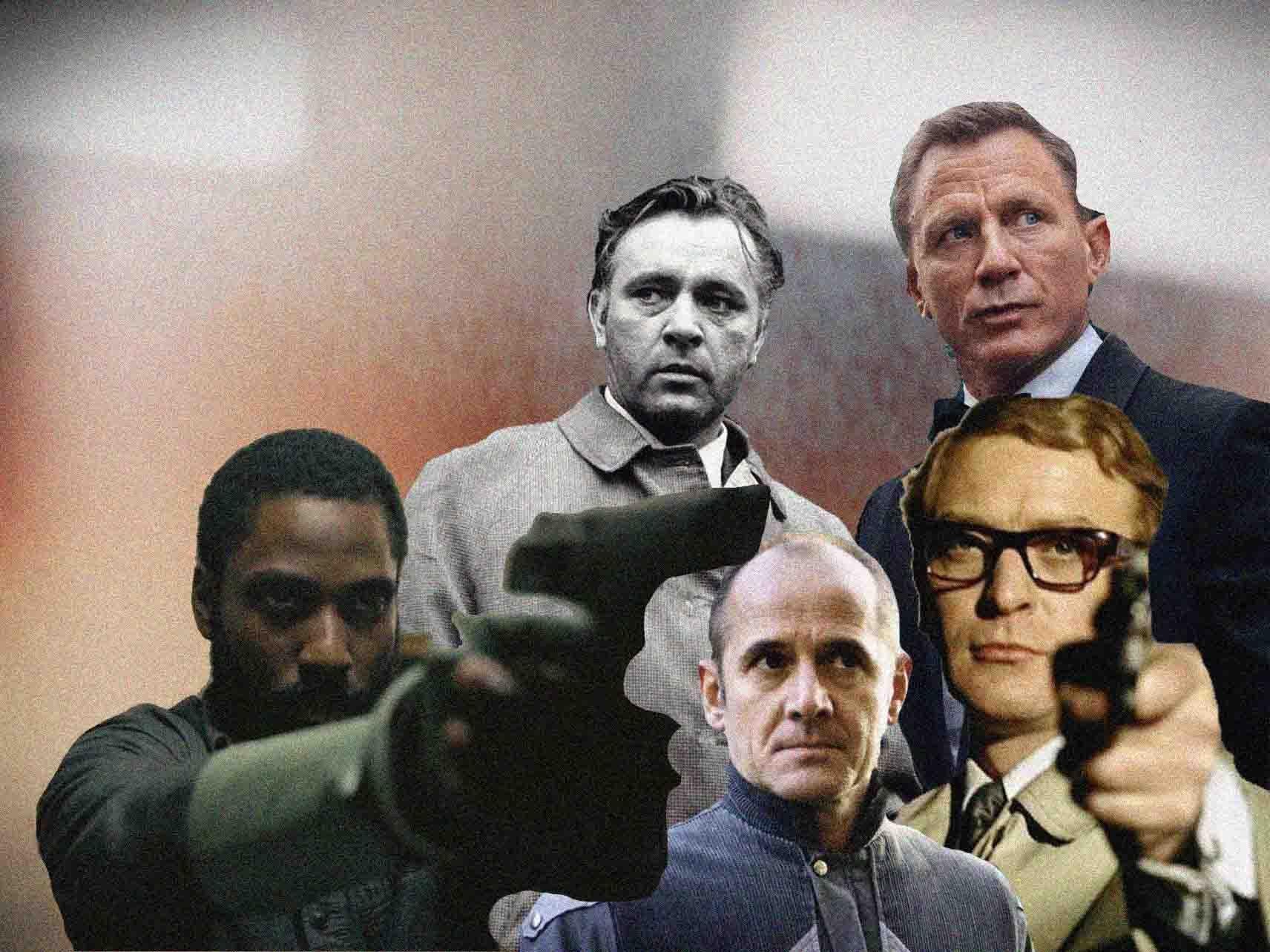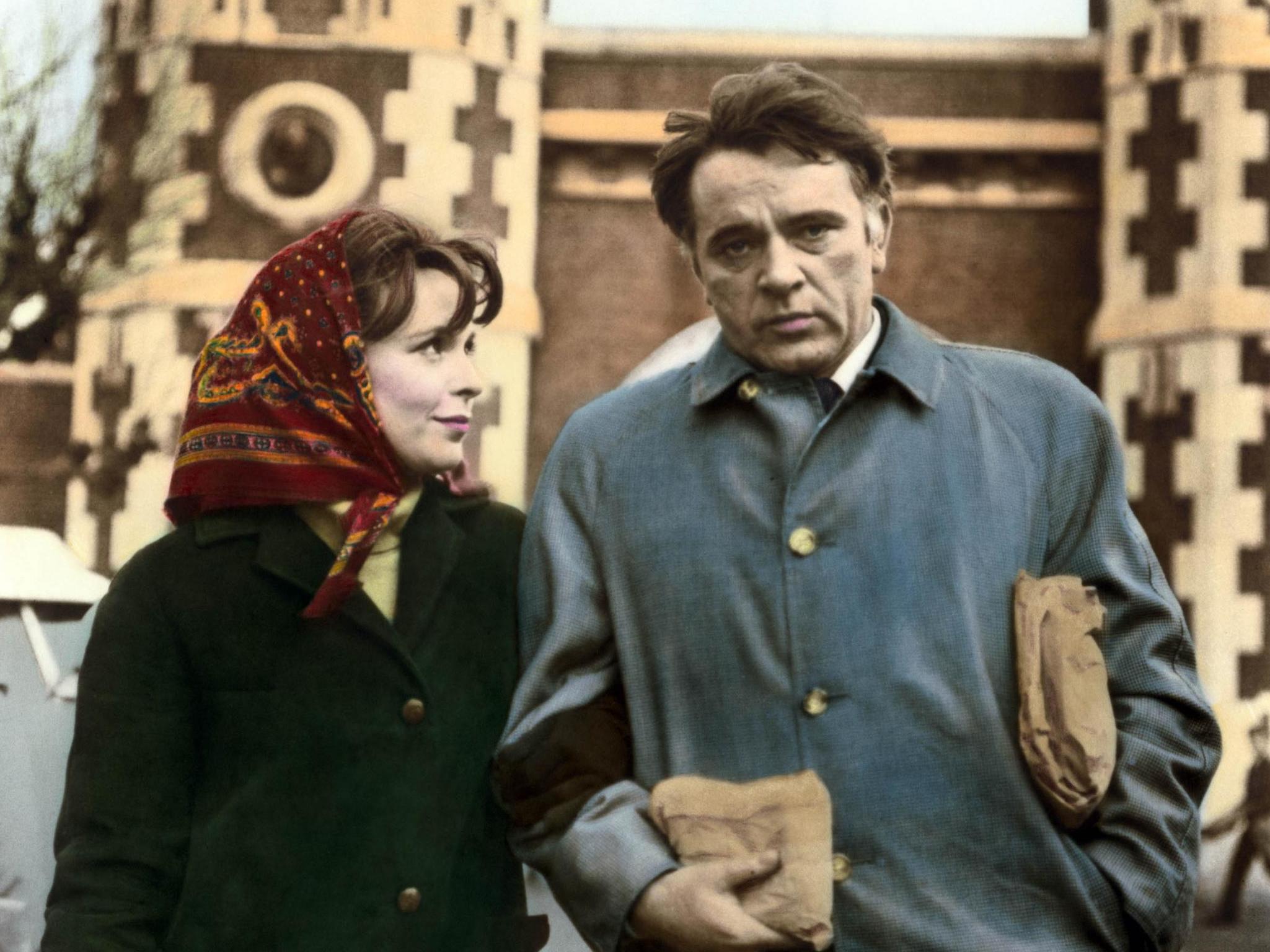I spy: How Tenet infiltrated cinema’s rich history of espionage films
Whether it’s slow character studies or picaresque escapism, the spy genre has given cinema some of its finest moments, writes Geoffrey Macnab. With Christopher Nolan’s mind-bending blockbuster finally hitting screens, it’s clear it has a lot to live up to

There is a revealing moment early on in Christopher Nolan’s epic, mind-bending new feature, Tenet. The “Protagonist” (John David Washington) meets a dapper and supercilious English spymaster (Michael Caine) in the dining room of a gentlemen’s club. The Protagonist (whose name is never given) doesn’t quite look the part. He is a young black man surrounded by fogeyish white establishment types. It is one of the few scenes in the film in which class, race and appearance are foregrounded. The Protagonist’s contempt for his host is self-evident. “You British don’t have a monopoly on snobbery,” he sneers. “Just a controlling interest,” Caine replies with the kind of deadpan, sarcastic wit you expect.
It is one of the few scenes in Tenet that you might also find in a John Le Carré adaptation or during a more class-conscious moment in a James Bond movie.
As all Bond aficionados will remember, in From Russia with Love (1963), Sean Connery’s 007 realises that Robert Shaw’s character Red Grant is not to be trusted because Grant orders red wine with the fish. That is an offence against etiquette that no self-respecting British gentleman spy would ever commit, not even one as rough-hewn as Connery’s Bond.
If you look through the history of espionage movies, you will find the codes that secret agents are breaking aren’t just for safes or lethal weapons. They’re social, too. Agents are trying to fit in with enemies who speak, dress and think differently to them. Perhaps that explains why the British, with their long-entrenched class system, have always excelled at the genre.
In most British-made spy movies, exhaustive attention is paid to how the agents dress: the shoes, suits and raincoats the men wear. We learn what music they enjoy, what they eat and drink, and often what weapons they use. In The Ipcress File (1965), Caine’s Harry Palmer isn’t just good with guns. He knows his way around the kitchen, too. In one famous scene, trying to impress a female visitor, he puts on a Mozart record as he chops onions and peppers and cracks two eggs with one hand.

“After the first rushes, we got a cable from Hollywood. ‘Dump Caine’s spectacles and make the girl cook the meal,’” Caine wrote in his autobiography. Homophobic US studio executives were adamant that real men didn’t cook omelettes. That notion still holds. In Tenet, when The Protagonist goes into a kitchen, it’s only to find implements with which to beat off Russian heavies who are about to torture him.
Spy movies from the days of Fritz Lang’s Spione (1928) and Alfred Hitchcock’s The 39 Steps (1935) onward have tended to veer off in two very different directions. Either they are dark, character-driven stories about disguise, corruption and personal betrayal, focusing on the “human factor” (the title of Otto Preminger’s 1979 Graham Greene adaptation) or they are escapist fantasies and spoofs. In the former camp, you have brooding, naturalistic dramas often taken from Greene, Len Deighton or Le Carré novels. In the latter are Austin Powers: The Spy who Shagged Me (1999), In Like Flint (1967), The Man From U.N.C.L.E (2015) and their ilk.
Tenet fits into neither tradition, although it shares hallmarks of both. It contrives to be cerebral and action-packed. Instead of a Cold War in which enemies are either side of the Iron Curtain, it has them crossing time, shooting “inverted bullets” and reversing chronology.
Nolan is looking to reinvent the espionage movie for a new digital generation. “I grew up loving spy movies; it’s a really fun and exciting branch of fiction,“ the director recently commented. ”But I didn’t want to do this type of film unless I felt I could bring something fresh to it. The simplest way to explain our approach is to say what we did with Inception for the heist genre is what Tenet attempts to bring to the spy movie genre.” He is drawing on ideas about time, memory and dreams that he has explored in his earlier movies. However, in certain respects, Tenet remains a traditional, even old-fashioned, spy yarn. The world it depicts is chauvinistic. The women, notably Elizabeth Debicki’s beautiful art dealer Kat, are treated abominably. The plot, boiled down to its essence, is about an agent trying to rescue the world from a super-villain (Kenneth Branagh with an excruciating Russian accent) and to save the girl in the process.
The Protagonist can hold his own with scientists, oligarchs and high-society art dealers but we learn very little about him. He can bluff his way through a conversation about Goya with Kat but, if he shares Harry Palmer’s cultural and culinary interests, he doesn’t show it.

The most downbeat espionage film of all time is surely the 1965 version of Le Carré’s The Spy Came in from the Cold, which might best be described as an anti-Tenet. Shot in dour black and white, it is also one of the richest and most atmospheric spy movies. Richard Burton stars as the British agent Alec Leamas, an embittered, alcoholic British agent seemingly going very quickly to seed. Its director Martin Ritt had been blacklisted during the anti-communist witch hunt. He was known for making character-focused, naturalistic movies with a strong social conscience. The Spy Who Came in From the Cold has very little action. Instead, it wallows in the banality, squalor and tedium of the spy’s life. One quality Leamas shares with Washington’s Protagonist is that he is an outsider. “If he were to walk into a London club the porter would certainly not mistake him for a member,” Le Carré wrote of him. Burton plays him as if he is under the shadow of a permanent hangover. He is continually shown sitting down, waiting for appointments at the labour exchange or the library where he is trying to get a job as part of his cover, or killing time on a park bench near Wormwood Scrubs. Burton’s Leamas is a solitary, truculent figure. The film has endless scenes of him in pubs, shopping for groceries and drinking tea as well as whisky. You might expect this to make monotonous viewing but it adds to the power of the storytelling. It is about getting under the character’s skin.
That is precisely what Florian Henckel von Donnersmarck’s The Lives of Others (2006) also strives to do. When you spy on someone, you delve into his or her life. You gain an uncomfortable intimacy with your quarry. The East German Stasi agent (Ulrich Mühe) investigating the playwright Dreyman (Sebastian Koch) realises how empty his own existence is by comparison with that of Dreyman.
In Tenet, Nolan strips away all the background details about The Protagonist. On the one hand, this makes him mysterious in the same way as Clint Eastwood is as the man with no name in Sergio Leone’s spaghetti westerns. On the other, it leaves him a cipher. We have very little idea of his motivation. His friendship with fellow agent Neil (Robert Pattinson), his handler, is not developed in any meaningful way. Nor is his romantic life sketched in anything but the most cursory fashion. In compensation, Nolan offers action, mind-bending stunts and intellectual stimulation.
Tenet follows in a tradition of spy stories in which the main characters have no emotional hinterland. In the novel of The Ipcress File, the protagonist is also unnamed. For the movie adaptation, producer Harry Saltzman (who also made the Bond films) insisted on giving him an identity. “Harry said this spy was to be the antithesis of James Bond: a very ordinary bloke, someone who could mingle unnoticed in a crowd and who should have an ordinary, boring name,” Caine later recalled. Saltzman said “the dullest person I ever met was called Palmer” and the name stuck.
Ironically, the anonymous Harry Palmer, as played by Caine, became a style icon in swinging London. People dressed like him and imitated him.
Jason Bourne was another spy as devoid of personality as the Protagonist in Tenet. In Doug Liman’s The Bourne Identity (2002), the film adapted from Robert Ludlum’s 1980 novel, Bourne has amnesia as a result of a traumatic head injury but his ruthless professionalism as a killer is unaffected. “He Knows a Lot, Just Not his Name,” was the headline to one review.
Spies existed on stage and in fiction long before they migrated on to the screen. When Fritz Lang directed his silent movie Spione in 1928, he filled the film with the same elements that have been found in spy movies ever since: chases, assignations, secret spy rings, blackmail, seduction and plenty of gadgets. The film has outlandish disguises, drive-by shootings, spies with tiny hidden cameras and characters uttering lines (via inter titles) like “I’d sooner die like a dog than become a traitor!”

There have now been hundreds, maybe thousands, of films set in the shadowy world of espionage since then. Every country makes them. They’ve reacted to war and political upheaval. The context changes but the ideas behind them remain largely the same. Many have featured spies as jaded, existential loners like Richard Burton’s Leamas or as relentless action heroes like Matt Damon’s Jason Bourne. Others have continued to mix action, romanticism and whimsical comedy in the spirit of Hitchcock’s 39 Steps and The Lady Vanishes (1938).
It’s telling that as cinemas reopen following the Covid lockdown, the film industry is looking to spy movies to save it from box-office catastrophe, first with Nolan’s Tenet and then with the new Bond movie, No Time to Die, now due to be released in November. The genre is as popular as it has ever been. The Ink Factory, the TV and film production company run by John Le Carré’s sons, is developing a new TV series adaptation of The Spy Who Came in From The Cold and enjoyed a major hit with their 2016 series, The Night Manager.
Spy movies, though, remain as elusive and hard to categorise as the characters whose tangled stories they tell. You can spend millions on filling them with stunts, chases and exotic locations but, often, the most intense moments will be the most intimate ones. In the TV version of Le Carré’s Tinker Tailor Soldier Spy (1979), viewers learned to wait for the moments when Alec Guinness’ George Smiley started to rub his spectacle lenses, lost in thought. That was always the sign the tension was rising. There was often more drama in the sight of an old man rubbing his oversized glasses than in even the most explosive action sequences. After all, when it comes to espionage movies, human behaviour is often the biggest mystery of all.
‘Tenet’ is out now. ‘The Spy Who Came in From the Cold’ is available on Amazon Prime. New Bond film ‘No Time to Die’ will be released in the UK on 12 November
Join our commenting forum
Join thought-provoking conversations, follow other Independent readers and see their replies
Comments